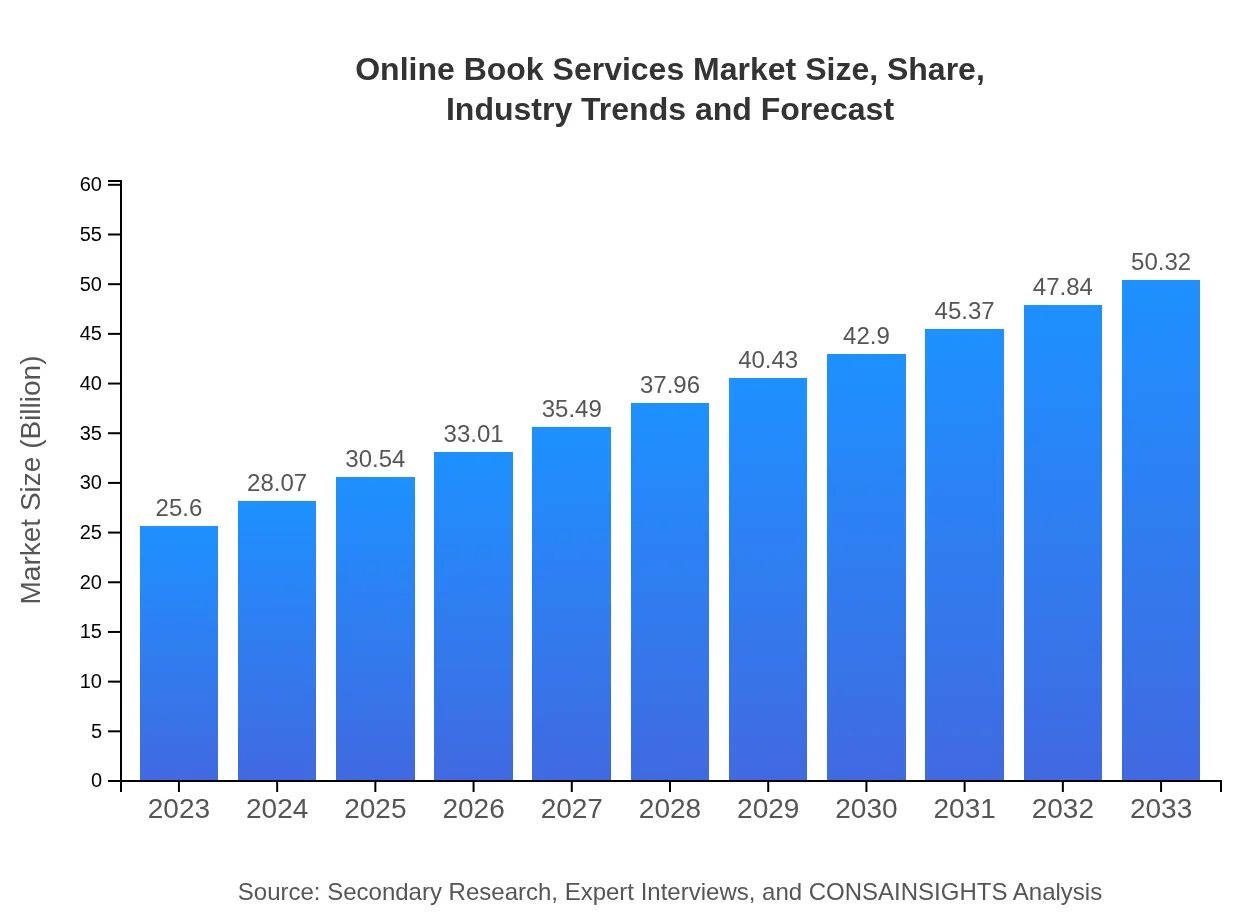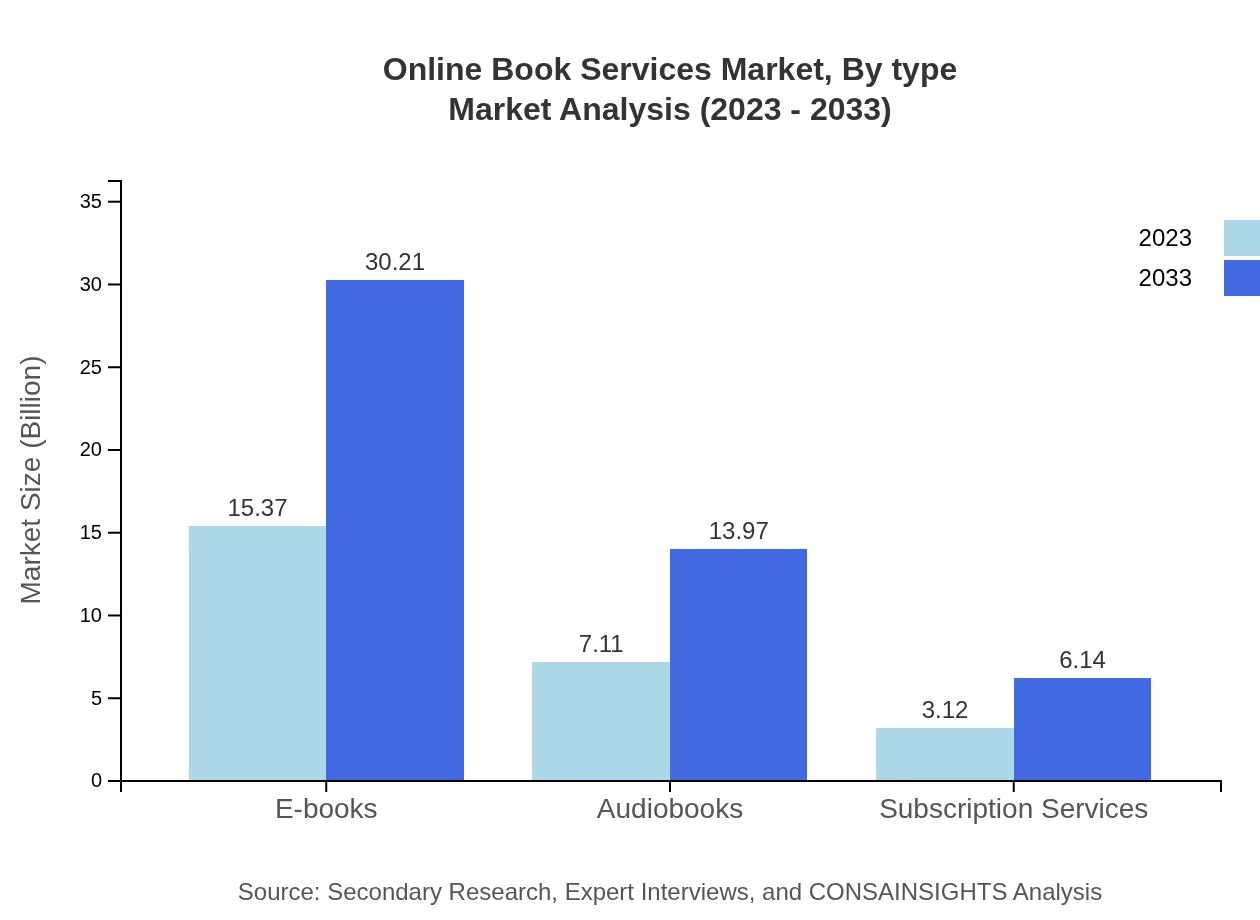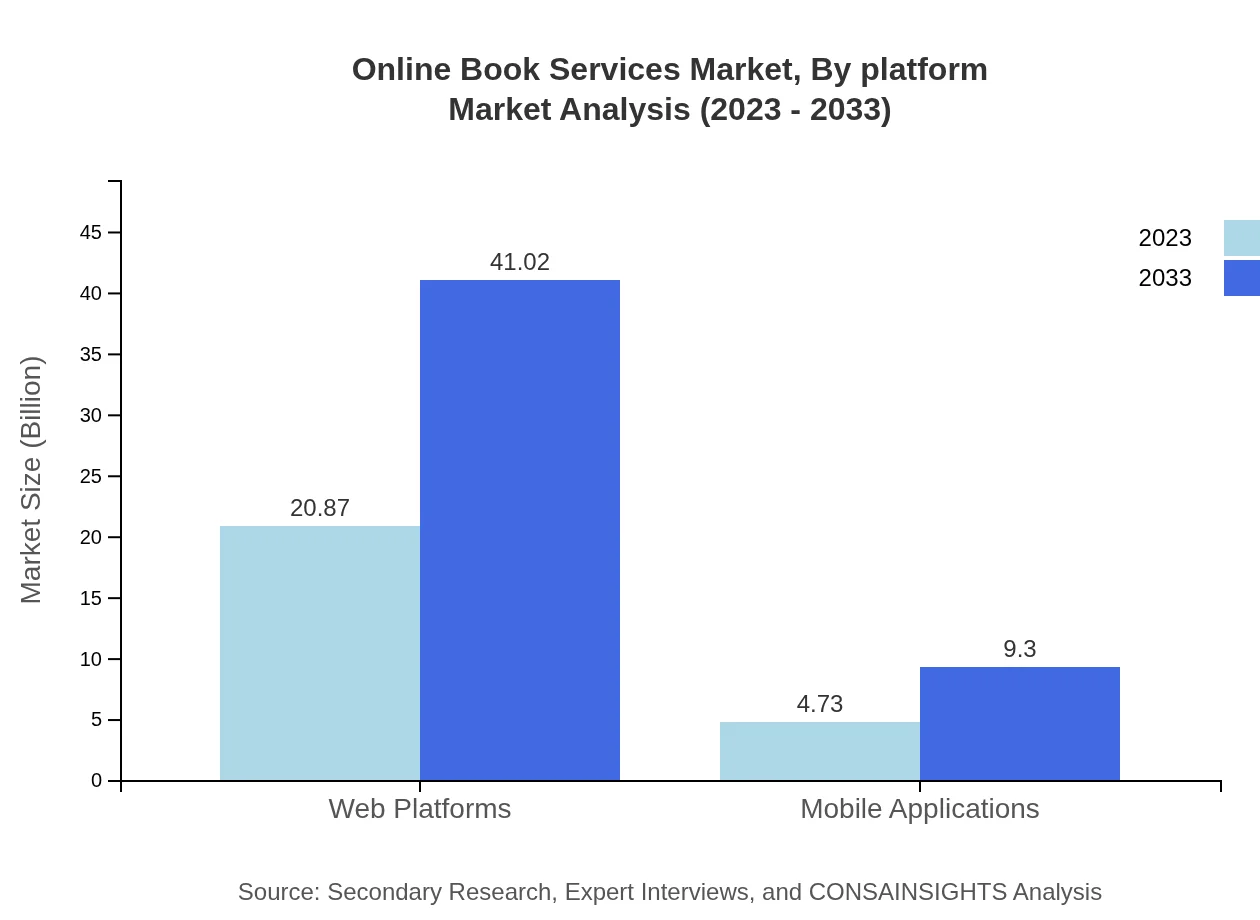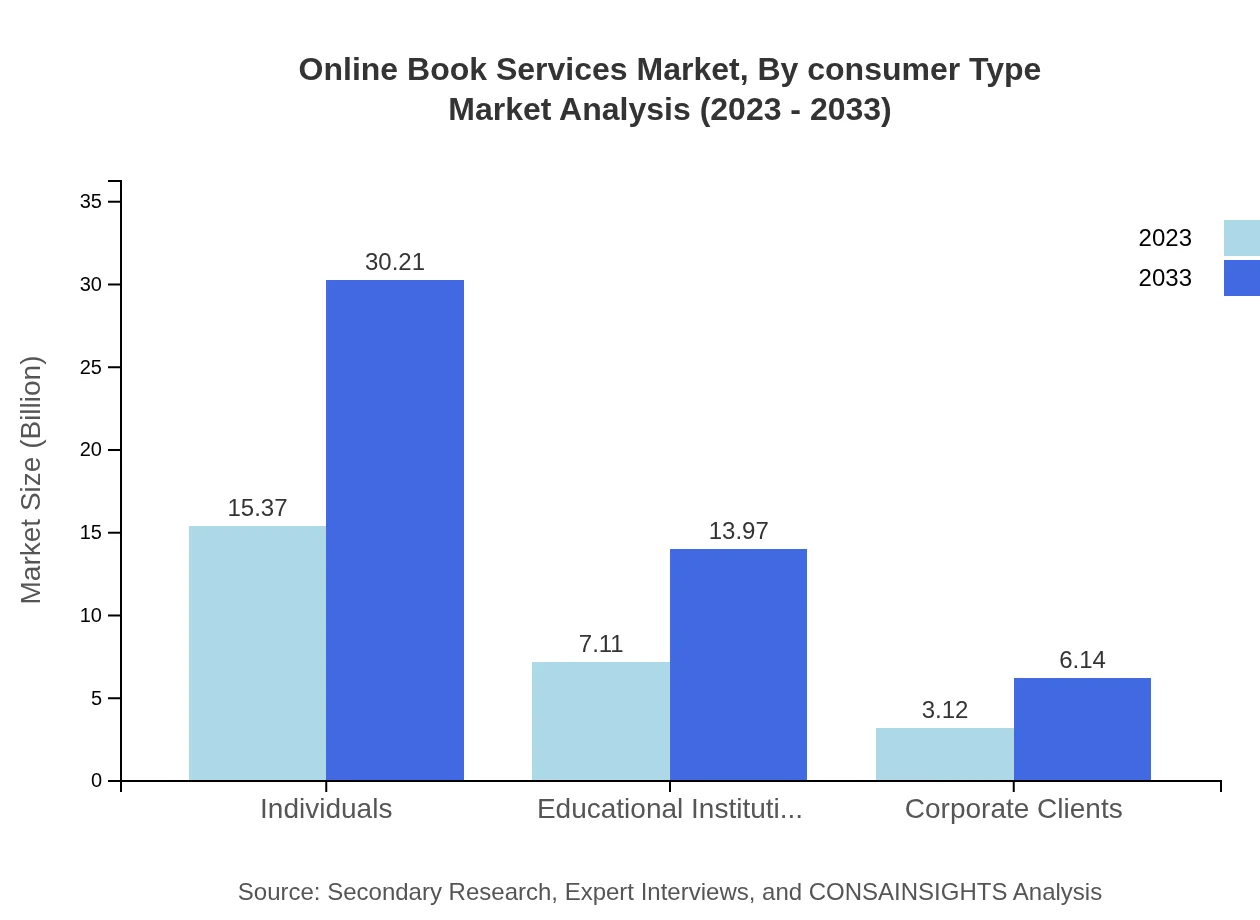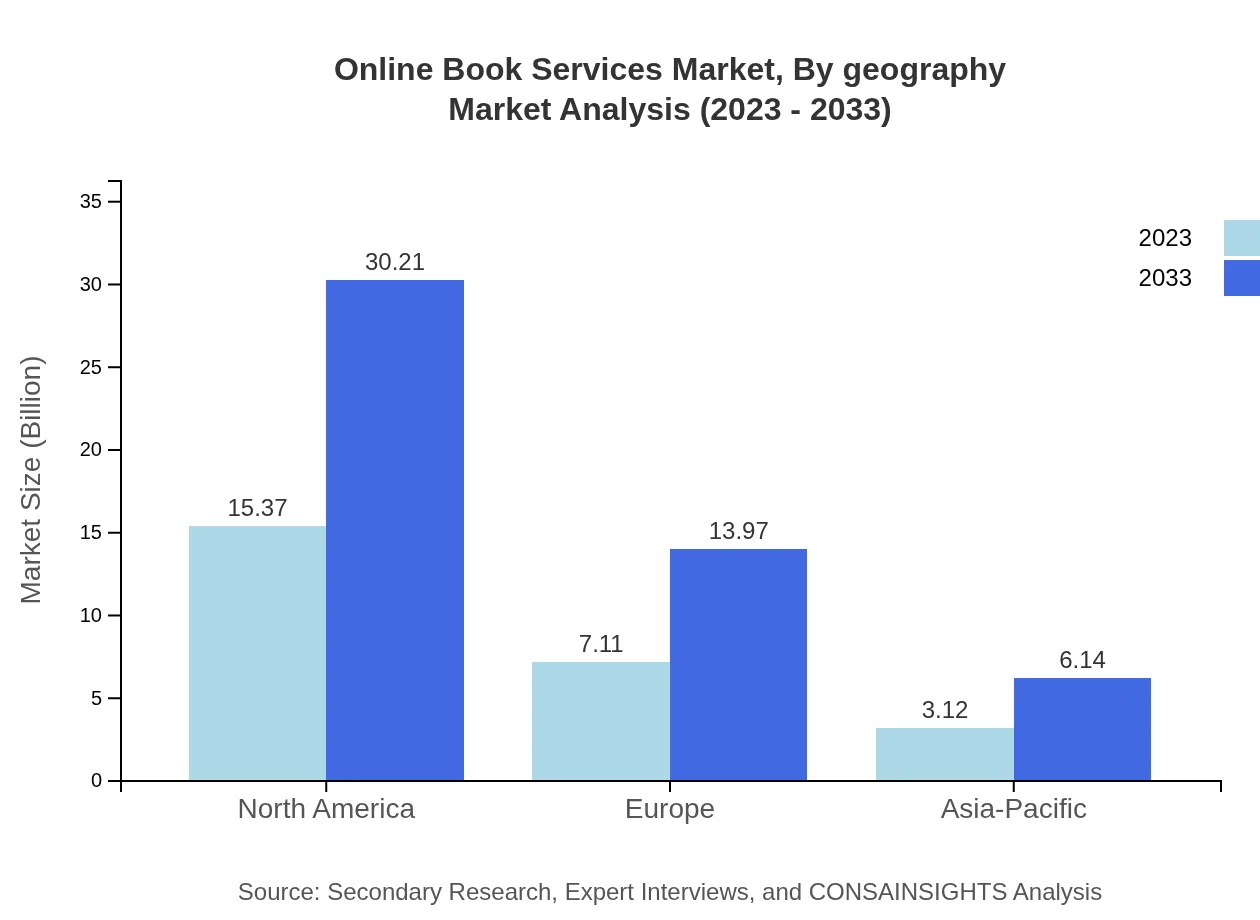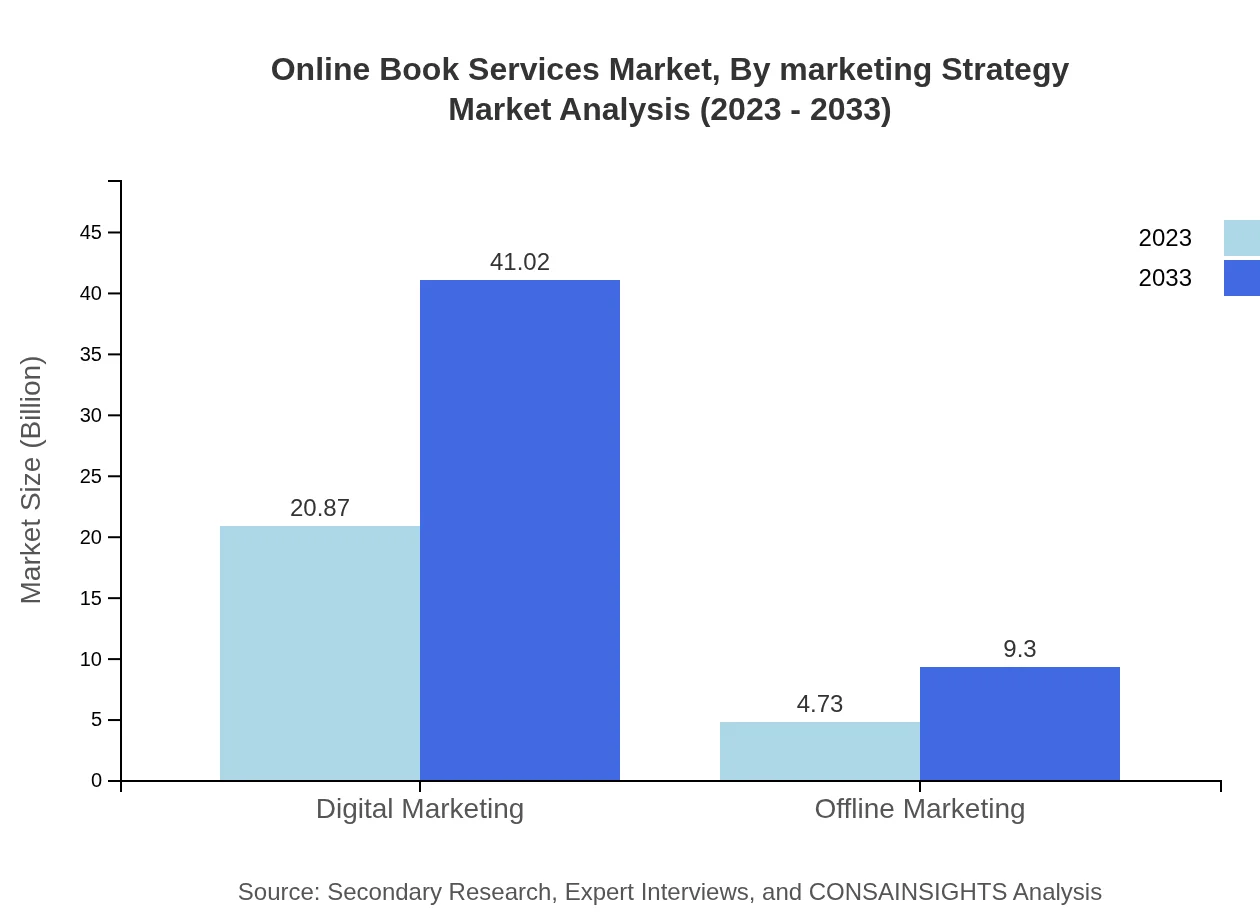Online Book Services Market Report
Published Date: 31 January 2026 | Report Code: online-book-services
Online Book Services Market Size, Share, Industry Trends and Forecast to 2033
This report delves into the Online Book Services market, offering insights and data projections from 2023 to 2033. It covers market size, growth rates, industry trends, regional analyses, and leading market players, providing a comprehensive look at the future of online book services.
| Metric | Value |
|---|---|
| Study Period | 2023 - 2033 |
| 2023 Market Size | $25.60 Billion |
| CAGR (2023-2033) | 6.8% |
| 2033 Market Size | $50.32 Billion |
| Top Companies | Amazon Kindle, Audible, Apple Books, Google Play Books, Rakuten Kobo |
| Last Modified Date | 31 January 2026 |
Online Book Services Market Overview
Customize Online Book Services Market Report market research report
- ✔ Get in-depth analysis of Online Book Services market size, growth, and forecasts.
- ✔ Understand Online Book Services's regional dynamics and industry-specific trends.
- ✔ Identify potential applications, end-user demand, and growth segments in Online Book Services
What is the Market Size & CAGR of Online Book Services market in 2023?
Online Book Services Industry Analysis
Online Book Services Market Segmentation and Scope
Tell us your focus area and get a customized research report.
Online Book Services Market Analysis Report by Region
Europe Online Book Services Market Report:
The European Online Book Services market is set to grow from $6.74 billion in 2023 to $13.25 billion by 2033. The convergence of advanced digital infrastructures and cultural attitudes favoring literature consumption enhances market dynamics. Countries like Germany, the UK, and France are keen consumers of both e-books and audiobooks.Asia Pacific Online Book Services Market Report:
In the Asia Pacific region, the Online Book Services market is projected to grow from $5.13 billion in 2023 to $10.08 billion by 2033. This growth is underpinned by increasing literacy rates and the proliferation of smartphones and internet services, allowing greater access to digital reading materials. Countries like China and India are leading in adoption, with significant investments in digital platforms further enhancing market accessibility.North America Online Book Services Market Report:
North America remains a stronghold for Online Book Services, with the market size anticipated to rise from $9.64 billion in 2023 to $18.95 billion by 2033. The region benefits from a tech-savvy population with a high propensity for digital content consumption, supported by strong distribution models and promotional activities from established players.South America Online Book Services Market Report:
The South American market is expected to experience growth from $1.24 billion in 2023 to $2.43 billion in 2033. This development is supported by increasing internet penetration and the adoption of digital literacy programs, although challenges such as economic fluctuations and limited infrastructure persist.Middle East & Africa Online Book Services Market Report:
The Middle East and Africa market is expected to grow from $2.85 billion in 2023 to $5.61 billion by 2033. This region shows vast potential due to increasing online connectivity and interest in educational platforms, although the market is still maturing with challenges related to content availability and localized production.Tell us your focus area and get a customized research report.
Online Book Services Market Analysis By Type
The Online Book Services market is diversified into key segments, including E-books, Audiobooks, and Subscription Services. E-books represent the largest segment, valued at $15.37 billion in 2023, projected to reach $30.21 billion by 2033. Audiobooks and subscriptions, while smaller at $7.11 billion and $3.12 billion respectively in 2023, show significant growth potential, particularly with the increasing popularity of hands-free reading experiences. Their recognition of diverse consumer preferences fuels this sector's overall growth.
Online Book Services Market Analysis By Platform
Platform-specific insights reveal a predominant inclination towards web-based services, which encompass 81.52% market share in 2023, continuing to grow. Mobile applications, while gaining traction, represent a smaller share. The rise of mobile applications is notable, particularly among younger demographics, projected to triple from $4.73 billion in 2023 to $9.30 billion by 2033.
Online Book Services Market Analysis By Consumer Type
The consumer-type segmentation shows individuals as the main consumers, expected to account for a significant portion of the market. Individuals represent a size of $15.37 billion as of 2023, which is forecasted to mirror the overall market's growth. Educational institutions and corporate clients are also important segments, with growing adoption of e-books for curricula and corporate training, potentially increasing from $7.11 billion and $3.12 billion respectively.
Online Book Services Market Analysis By Geography
Geographically, North America is the leading region, contributing significantly to the market size, followed by Europe and Asia Pacific, which is rapidly emerging. The distinct consumer preferences and varying levels of digital infrastructure across these regions create diverse opportunities for tailored service offerings.
Online Book Services Market Analysis By Marketing Strategy
Marketing strategies are evolving with the shift towards digital channels. Digital marketing accounts for approximately 81.52% of the market, allowing greater engagement through social media and targeted ads, whereas offline marketing strategies, while crucial, are on the decline owing to the effectiveness and reach of digital platforms.
Online Book Services Market Trends and Future Forecast
Tell us your focus area and get a customized research report.
Global Market Leaders and Top Companies in Online Book Services Industry
Amazon Kindle:
Amazon's Kindle platform remains a leader in e-book sales with vast collections and innovative services such as Kindle Unlimited, reflecting its substantial role in shaping consumer preferences.Audible:
Owned by Amazon, Audible positions itself as the dominant player in the audiobook market, offering a comprehensive subscription service that has changed how consumers experience literature.Apple Books:
Apple Books combines e-commerce with a strong digital reading experience, attracting a broad demographic, thanks to its seamless integration with Apple devices.Google Play Books:
As part of Google's ecosystem, Play Books offers a flexible platform for e-books and audiobooks, facilitating easy access across various devices.Rakuten Kobo:
Kobo offers unique features like e-readers and extensive partnering with libraries, marking its presence as a competitive player in the global online reading service space.We're grateful to work with incredible clients.









FAQs
What is the market size of online Book Services?
The online book services market is projected to reach approximately $25.6 billion by 2033, expanding at a CAGR of 6.8%. This growth reflects increasing digital consumption and the convenience of online platforms as more users turn to e-books and audiobooks.
What are the key market players or companies in this online Book Services industry?
Key players in the online book services market include Amazon, Apple Books, Google Play Books, and Kobo. These companies dominate due to their wide selection of titles, robust platforms, and integration of advanced technologies into their services.
What are the primary factors driving the growth in the online Book Services industry?
Several factors are driving growth in the online book services industry, including the rising popularity of e-books and audiobooks, increased smartphone penetration, and the convenience of digital platforms. Additionally, subscription models enhance user engagement and retention.
Which region is the fastest Growing in the online Book Services?
The fastest-growing region in the online book services market is North America, expected to increase from $9.64 billion in 2023 to $18.95 billion by 2033. Europe and Asia Pacific also show strong growth, driven by rising digital literacy and internet penetration.
Does ConsaInsights provide customized market report data for the online Book Services industry?
Yes, ConsaInsights offers customized market report data tailored to the online book services industry. Clients can specify parameters, such as market segments and geographical regions, to receive targeted insights that meet their strategic needs.
What deliverables can I expect from this online Book Services market research project?
Deliverables from the online book services market research project typically include comprehensive reports detailing market size, competitor analysis, and growth drivers. Additionally, clients receive data visualizations and actionable insights tailored to their business objectives.
What are the market trends of online Book Services?
Current trends in the online book services market include the expansion of subscription services, the popularity of audiobooks, and the integration of augmented reality in reading. Growth in mobile application usage also shows a shift in consumer preferences towards portable reading solutions.

